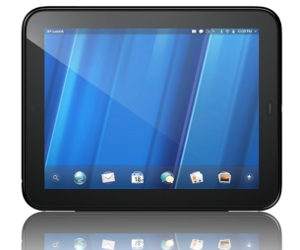HP buys Autonomy for £7bn, kills webOS devices and looks to spin off PC unit

All change as HP goes all-in on enterprise...
HP has decided to go big on its enterprise software and services play, shedding its PC unit, killing off its webOS devices and making a multibillion pound offer for Autonomy.

HP has announced that it will discontinue operations for webOS devices, such as the HP TouchPadPhoto: HP
HP announced its intention to buy Autonomy on Thursday for a price of £25.50 a share, or around £7bn.
Autonomy, founded in 1996 by its current CEO Mike Lynch and which lists the likes of Coca-Cola, Nestle and Standard Life as customers, has recommended its shareholders should accept the offer and the deal is expected to close before the end of the year.
According to HP, the acquisition will boost its cloud offerings and "strengthen capabilities for data analytics, the cloud, industry capabilities and workflow management", as well as add valuable IP in vertical markets such as healthcare. It will, according to HP, also support its traditional printing business by "continu[ing HP's] growth of document and content management and higher value commercial printing opportunities".
Lynch will continue to head Autonomy and report to HP's CEO Léo Apotheker, with the business still run separately, Apotheker said.
"This is a milestone moment because there is a very real and concrete need for our customers to address the explosion of structured and unstructured information... Autonomy sees the business information transformation and subsequent market opportunity exactly as we do. Moreover, Autonomy's business is well aligned to HP's effort to change and focus our business mix," he said yesterday.
Meanwhile, HP is looking at the future of its personal computing business, announcing a possible spin-off of its consumer PC unit and shutting down its webOS hardware business.
HP is currently exploring its options for the personal systems business - a process expected to take 12 to 18 months - "including the exploration of the separation of its PC business into a separate company through a spin-off or other transaction", HP said.
The company has also decided to kill off its webOS device unit, whose most recent offerings included the TouchPad tablet.
"Consumers are changing the use of the PC. The tablet effect is real and...
...sales of the TouchPad are not meeting our expectations... The velocity of change in the personal device marketplace continues to increase and the competitive landscape has grown increasingly more complex especially around the personal computing arena," Apotheker said yesterday.
HP had to take "the difficult but necessary decision" to close its webOS hardware operations within Q4 2011, he added.
HP only announced the acquisition of Palm just over a year ago, when it paid $1.2bn for the mobile device and OS maker.
Analysts suggested at the time that HP's eye was on the webOS mobile platform rather than Palm's hardware expertise, with a view to enabling it to create a webOS tablet to compete with Apple's iPad.
At the time, HP said buying Palm would improve its ability to "participate more aggressively in the fast-growing, highly profitable smartphone and connected mobile device markets".
The first of those devices were unveiled in February this year with the announcement of a HP-branded webOS tablet and two smartphones.
The tablet, the HP TouchPad, did not launch until July and despite a positive reception - with the TouchPad being touted as a serious rival to Apple's iPad - sales did not live up to HP's expectations. In a telling move earlier this month the company heavily discounted the slate in the US.
The webOS operating system, however, seems likely to live on: "We have been tracking closely the performance of webOS and analysing its operational performance and market opportunities. We were successful at launching software that was praised for its different shaded user experience. We know that many developers feel the operating systems is elegantly designed and it's a respected platform. Therefore, we are exploring options for how best to optimise the value of webOS software going forward," Apotheker said.
Analysts are sceptical as to how beneficial this week's moves will be to HP's long-term future.
"HP, through its plans to shutter webOS and seek alternatives for its PC business, is limiting its exposure to the consumer hardware market and, instead, going all-in on a strategy of increasing its revenue and margins with an enterprise-focused bundle of software, services, servers and storage," said Beau Skonieczny, research analyst in industry watchers TBRI's computing practice, in a research note.
"Removing all or part of its low-margin consumer PC business and the expense of fighting its way into the mobile and tablet markets with a fourth offering (after Apple, Google, and Microsoft) will improve HPs margins in the short term. The company will be challenged, however, to morph into a highly profitable purveyor of software, services, servers and storage - a goal it has pursued for some time," Skonieczny added.
Anthony Miller, managing partner at analysts TechMarketView, added in a research note: "The announcement that HP is to (a) buy Autonomy, (b) scrap its webOS tablets and smartphones (and in so doing write off the $1b+ it paid for Palm in April last year plus who knows how much more R&D to try to turn that sow's ear into a silk purse), and (c) potentially sell off its PC business, completely overshadowed its Q3 results.
"And just as well, as they were a lacklustre set of numbers, carrying with them yet another downgrade to FY [financial year] guidance... Buying Autonomy - as fabulous a business that it is - does not bring HP any closer to becoming a software company than buying Palm made it a mobile internet company, or than buying EDS turned it into a services company."
silicon.com's Natasha Lomas contributed to this article